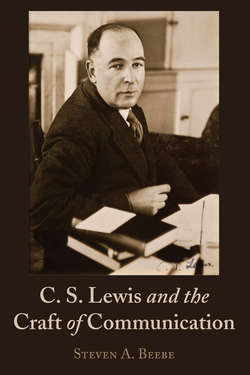Читать книгу C. S. Lewis and the Craft of Communication - Steven Beebe - Страница 16
На сайте Литреса книга снята с продажи.
Оглавление←0 | 1→
| 1 | |
| The Case for C. S. Lewis as Master Communicator |
“I have an idea of what is good and bad language … Language is an instrument of communication. The language which can with the greatest ease make the finest and most numerous distinctions of meaning is best.”1
- C. S. Lewis
“Be sure you know the meaning (or meanings) of every word you use.”2
- C. S. Lewis
One of the first things I give my students when I teach my course, “C. S. Lewis: Chronicles of a Master Communicator,” is the final examination; it appears on the last page of the syllabus. I realize that it is unusual to give the students the final exam questions early, especially on the first day of class. But giving students their final exam on day one helps them know what to look for as they begin to examine Lewis as communicator. (Education, I believe, should not be a game of “Guess what I want you to learn,” but rather, a guided conversation with clear goals and objectives.) The final exam consists of two questions that form the overarching goals of the course:
1. What communication principles did C. S. Lewis discuss, either implicitly or explicitly, in his works?
←1 | 2→
2. What techniques of effective communication did Lewis use in his writing and speaking that contributed to his success as an author and speaker?
Underlying these two questions is a claim that informs the premise of this book: C. S. Lewis was one of the most effective communicators of the twentieth century as evidenced by his continued popularity. So, in effect, by writing this book I am taking my own final exam.
Lewis was a master communication craftsperson. He was also a mere communicator. As in the title of one of his most widely read books, Mere Christianity, mere means essential, absolute or, as derived from the Middle English use of the word, pure.3 (Lewis was not the first to use the phrase “Mere Christianity.” Richard Baxter, a seventeenth-century Puritan, used those words to avoid denominational labels when describing Christians.)4 C. S. Lewis was a masterful, “pure communicator” who also wrote about essential principles of communication. This book makes the case that C. S. Lewis knew, discussed, and used effective principles of communication; his application of those principles explains, in part, his enduring success as an author, speaker, and broadcaster.
Being a skilled communication craftsperson does not mean he was a perfect communicator. Lewis sometimes made tactical errors. He misread his audience on rare occasions, and by his own admission, he was not always skilled at appealing to the emotions of his listeners or readers.5 Yet he learned from his experiences and drew upon a comprehensive set of principles about language, meaning, and communication to become one of the twentieth Century’s most celebrated authors and speakers. He was not only a Christian apologist, literary scholar, and prolific author of both fiction and non-fiction, he was an accomplished communication practitioner who modeled what he said about communication.
The assumption that C. S. Lewis was a master at crafting enduring communication messages is supported by three arguments. First, Lewis was and continues to be an astoundingly popular author. People bought his books during his lifetime, and since his death more than five decades ago, his book sales continue to be strong. Both Samuel Joeckel’s book The C. S. Lewis Phenomenon and Stephanie Derrick’s book The Fame of C. S. Lewis document the continuing popularity of Lewis studies, an especially thriving industry in the U.S., with more books about C. S. Lewis published each year.6
A second argument to support his legacy as a communicator is that, in addition to continued popular success, Lewis has garnered considerable professional accolades. He earned his living teaching, writing, and speaking. His scholarly books remain required reading in many English department graduate programs ←2 | 3→that focus on literary criticism and English literature of the sixteenth century. Besides inclusion on undergraduate and graduate student reading lists, Lewis and his works remain a popular topic for doctoral dissertations, master’s theses, and other academic research and scholarly inquiry.
Finally, both Lewis’s continued popularity and professional contributions and influence support the third and most important argument for the “master communication craftsperson” label—Lewis embedded lessons about how to communicate effectively throughout his works. In addition to being an effective communicator, he also wrote about principles and strategies for communicating well. Many authors are popular, and a few also have impressive professional credentials, but only a select handful devote considerable attention to teaching others how to be effective communicators. Lewis was a professor of communication.
This chapter makes the case that C. S. Lewis should be the focus of a book about communication. He was prolific and endures as a multi-million-book popular author. Colleges and universities continue to assign his work; scholars continue to mine it for his insights about literature and language. And he often wrote about how to be an effective communicator. His spoken and written messages not only model communication principles, but also offer numerous prescriptions for communication effectiveness. Let’s explore these three reasons in more detail.
